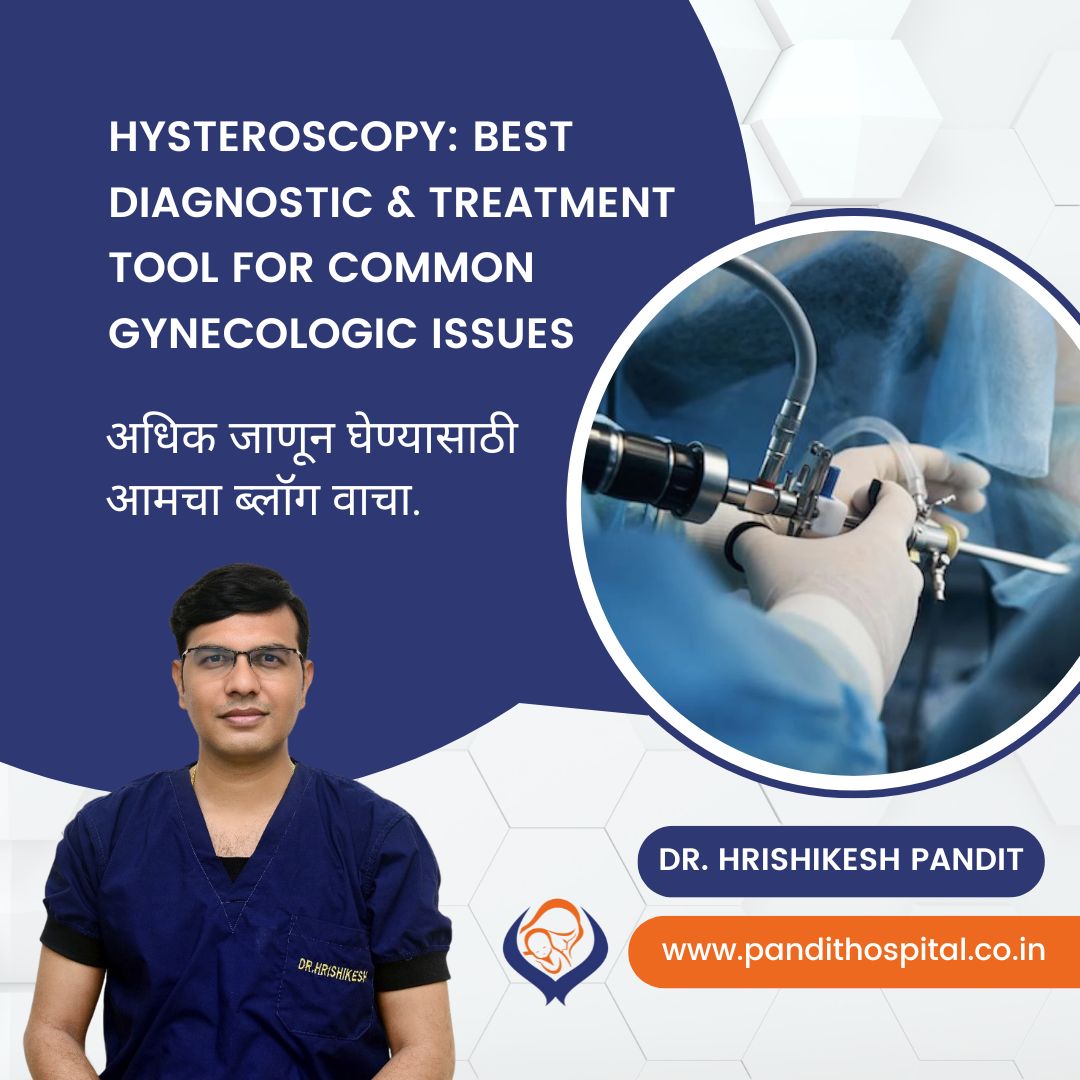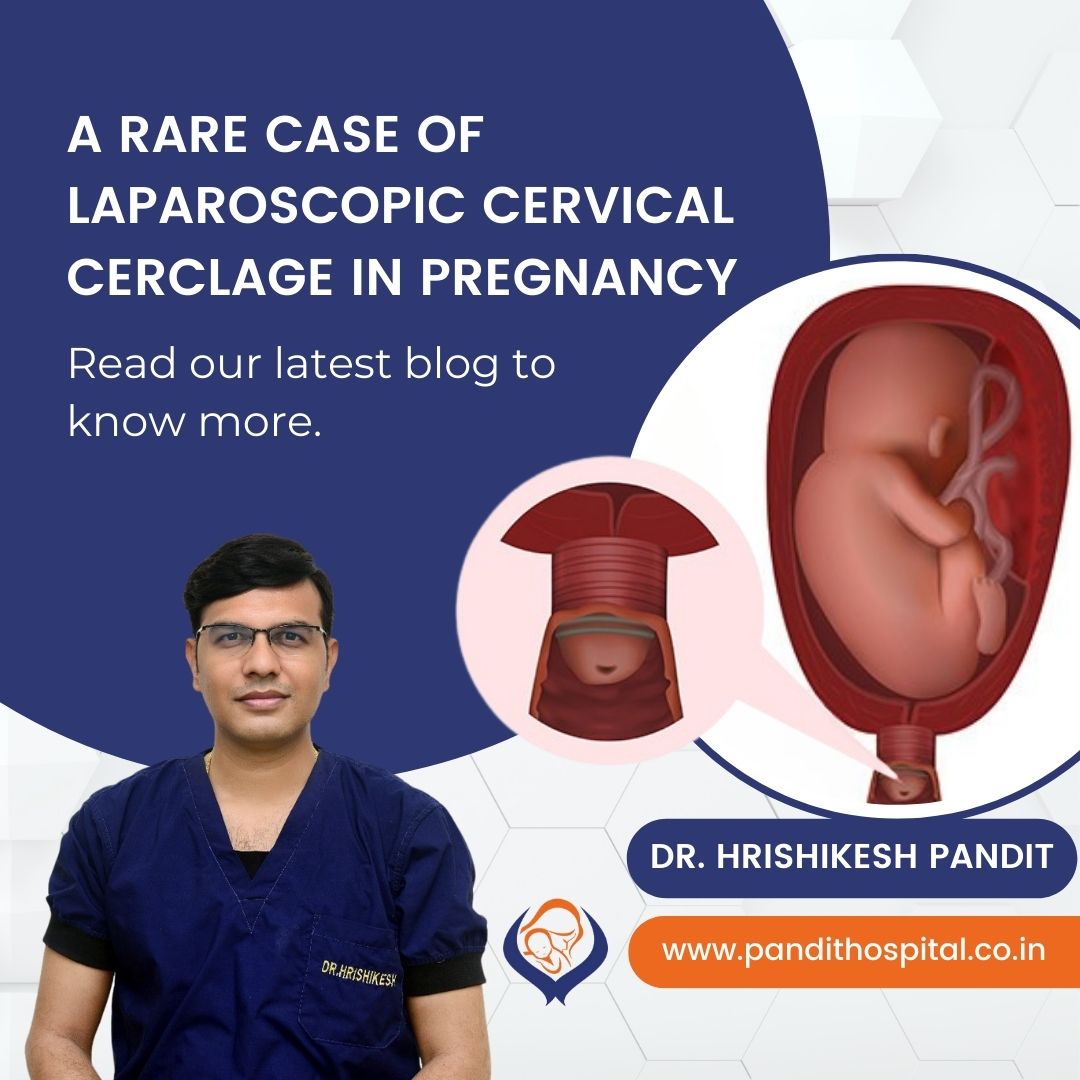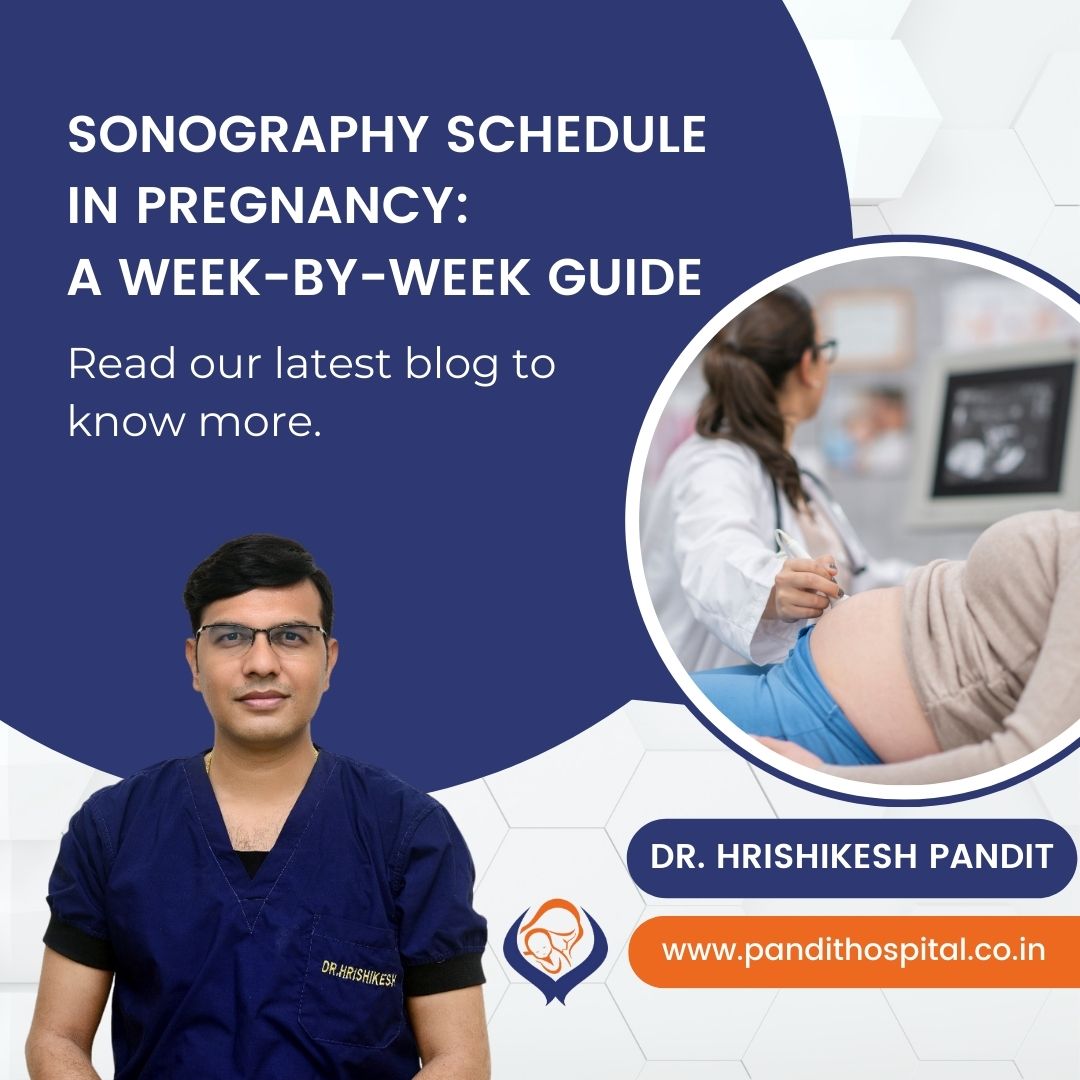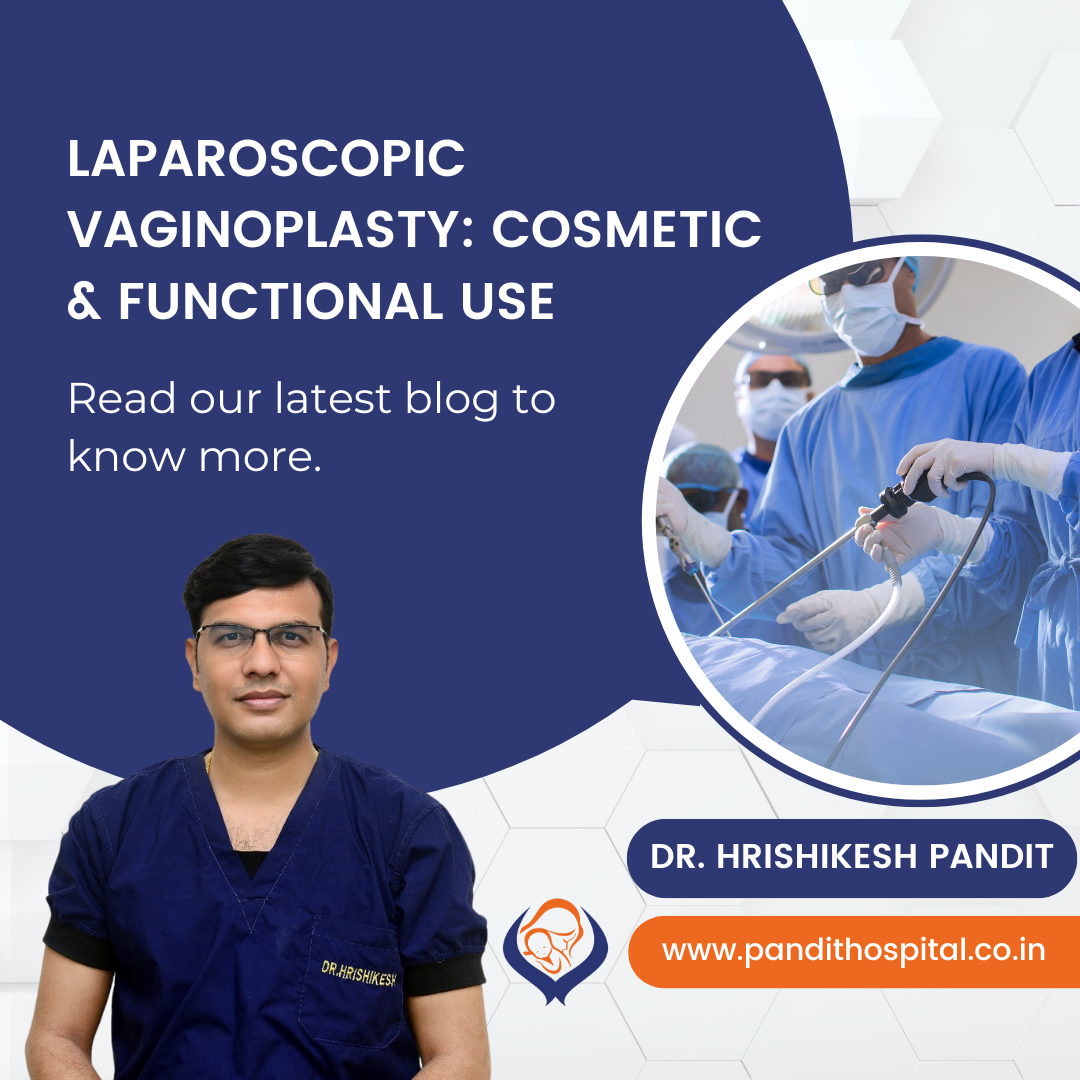Hysteroscopy is a minimally invasive procedure used to diagnose and treat various gynecological issues by allowing a clear view of the inside of the uterus. If you’re in Ahilyanagar, Ahmednagar, and searching for expert care, look no further than Pandit Hospital in Bhingar. Led by the renowned endoscopic gynecologist, Dr. Hrishikesh Pandit, Pandit Hospital provides top-notch hysteroscopy treatment with personalized care tailored to each patient’s needs.
Read this blog in Marathi
Dr. Hrishikesh Pandit is widely regarded as the best in the field, with extensive experience in performing hysteroscopies to diagnose and treat a range of uterine conditions. Whether you’re dealing with unexplained bleeding, uterine fibroids, or other gynecological issues, Dr. Pandit’s expertise ensures you receive the highest standard of care in a compassionate environment.
Hysteroscopy is a procedure where a thin, lighted tube called a hysteroscope is inserted through the cervix into the uterus. This allows the gynecologist to examine the lining of the uterus and identify any abnormalities. Hysteroscopy can be used for both diagnostic and therapeutic purposes, making it a versatile tool in gynecology.
Hysteroscopy is highly effective in diagnosing and treating several uterine conditions, including:
- Abnormal Uterine Bleeding: Hysteroscopy helps identify the cause of irregular bleeding, whether it’s due to hormonal imbalances, polyps, or other conditions.
- Uterine Polyps: These are non-cancerous growths in the lining of the uterus that can cause heavy periods and infertility. Hysteroscopy allows for their precise removal.
- Fibroids: Submucosal fibroids, which grow inside the uterine cavity, can be removed using hysteroscopy.
- Adhesions (Asherman’s Syndrome): Scar tissue within the uterus can be diagnosed and treated through hysteroscopy, helping restore normal uterine function.
- Septum: A uterine septum, a congenital defect, can be diagnosed and corrected using hysteroscopy, improving reproductive outcomes.
- Unexplained Infertility: Hysteroscopy is often used in the evaluation of infertility to detect issues like uterine abnormalities or endometrial polyps that could be hindering conception.
Hysteroscopy offers several advantages over traditional surgical methods:
- Minimally Invasive: The procedure is less invasive compared to open surgery, reducing recovery time and minimizing scarring.
- Quick Recovery: Most patients can return to their normal activities within a few days, making it a convenient option for those with busy lives.
- Accurate Diagnosis: Hysteroscopy provides a clear view of the uterine cavity, allowing for precise diagnosis and treatment.
- Fertility Preservation: For women looking to preserve or enhance their fertility, hysteroscopy offers a safe way to correct uterine abnormalities without compromising reproductive health.
It’s important to know when to seek the expertise of a gynecologist for a hysteroscopy. If you experience any of the following symptoms or conditions, consulting with Dr. Hrishikesh Pandit at Pandit Hospital may be beneficial:
- Irregular or Heavy Periods: If your menstrual cycle is unpredictable or you experience unusually heavy bleeding, hysteroscopy can help diagnose the underlying cause.
- Severe Menstrual Pain: Painful periods could indicate the presence of fibroids, polyps, or other uterine conditions that hysteroscopy can diagnose and treat.
- Difficulty Getting Pregnant: If you’ve been trying to conceive without success, a hysteroscopy might uncover uterine factors contributing to infertility.
- Repeated Miscarriages: For women who have experienced multiple miscarriages, hysteroscopy can help identify uterine abnormalities that could be causing pregnancy loss.
- Postmenopausal Bleeding: Any bleeding after menopause should be evaluated promptly, as it could be a sign of uterine polyps or cancer, both of which hysteroscopy can help diagnose.
Dr. Pandit’s approach is patient-centered, ensuring that each woman receives the most appropriate treatment for her condition. Whether it’s a diagnostic procedure to identify a problem or a therapeutic intervention to correct an issue, Dr. Pandit’s skill and expertise make a significant difference in patient outcomes.
- Is hysteroscopy painful?
Hysteroscopy is usually performed under local or general anesthesia, so patients typically experience little to no pain during the procedure. Some mild cramping may be felt afterward.
- How long does the procedure take?
The procedure usually takes between 10 to 30 minutes, depending on whether it is diagnostic or operative.
- Can I go home the same day?
Yes, hysteroscopy is typically an outpatient procedure, meaning you can go home the same day.
- Are there any risks associated with hysteroscopy?
While hysteroscopy is generally safe, some risks include infection, bleeding, or injury to the uterus. However, these complications are rare, especially in the hands of an experienced gynecologist like Dr. Hrishikesh Pandit.
- How soon can I return to normal activities?
Most women can return to their normal activities within a day or two after the procedure.
Hysteroscopy is a vital tool in modern gynecology, offering both diagnostic and therapeutic benefits for a wide range of uterine conditions. If you’re in Ahilyanagar, Ahmednagar, and are experiencing symptoms like abnormal bleeding, severe menstrual pain, or difficulty conceiving, consulting with Dr. Hrishikesh Pandit at Pandit Hospital in Bhingar can provide the answers and treatment you need.
With his expertise in endoscopic gynecology and the state-of-the-art facilities at Pandit Hospital, you can trust that you’re in the best hands. Don’t hesitate to reach out to Pandit Hospital to schedule a consultation and take the first step toward better reproductive health.
At Pandit Hospital, you are in safe hands!
To consult Dr. Hrishikesh Pandit, Click Below,
Pandit Hospital – Best Maternity care center in Ahmednagar
LET’S SEE OUR INTRO VIDEO
At Pandit Hospital, we provide all the maternity services from antenatal to postnatal period under one roof
Let's Connect!!
0241-2441717 / 0241-2442344
About author:
Dr. Hrishikesh Pandit:
Dr. Hrishikesh Pandit is one of the best obstetrician and gynecologist in India. He is also a well-renowned Laparoscopic surgeon. He obtained his MS (Ob Gyn) degree from the prestigious Pravara Institute of Medical Sciences. He has also done fellowship and diploma courses in laparoscopic surgeries and cancer treatment from Tata Hospital and Keil University, Germany. His surgical cases, papers and videos has been chosen in many international forums of gynecology.
At Pandit Hospital, we are always working hard to provide its patients with the highest level of medical innovation and patient care. With the aim of delivering complete maternity & gynecological care under one roof with the help of all contemporary amenities and cutting-edge medical equipment. Dr. Hrishikesh Pandit has a vision to bring the best of facilities regarding laparoscopy surgeries in the city of Ahmednagar. He is the pioneer of 3D Laparoscopy technology is Ahmednagar.
Latest Articles
Dr. Hrishikesh Pandit is one of the best laparoscopy surgeons in India. His determination to bring 3D Laparoscopy technology to Ahmednagar has eventually helped so many patients. Read the latest articles by Dr. Hrishikesh Pandit on Gynecology, gastric issues, and health tips for mothers during pregnancy.
Laparoscopic Cerclage is done for cervical insufficiency or early abortion history. Consult Dr. Hrishikesh Pandit to know more about it. Excellent results in High Risk Pregnancies. Watch video on YouTube.
At Pandit Hospital, Ahilyanagar, we provide advanced maternity care with state-of-the-art 3D laparoscopy and sonography services to ensure the safety of both mother and baby.
Pandit Hospital, led by Dr. Hrishikesh Pandit, offers 3D laparoscopic treatments including Laparoscopic Vaginoplasty, to restore both form and function in women seeking vaginal reconstruction in india.
FAQ
You should consult a doctor during the first 6 to 8 weeks of your pregnancy, or when your period is 2 to 4 weeks late.
If your contractions are 5 minutes apart, lasting for 1 minute, for 1 hour or longer, it’s time to head to the hospital.
Doctors recommend an infertility evaluation if you have not gotten pregnant after 1 year of having regular sexual intercourse without using birth control. If you are older than 35, an evaluation is recommended after 6 months of trying.
Yes, You can. But most babies need 39 weeks to develop fully. Induced or planned delivery before that time—without a valid medical reason—is not in the best interest of the baby or the mother. After 39 weeks you can plan delivery.
Women who are 21 to 29 should have a Pap test alone every 3 years. HPV testing alone can be considered for women who are 25 to 29, but Pap tests are preferred. Women who are 30 to 65 have three options for testing. They can have a Pap test and an HPV test (co-testing) every 5 years. They can have a Pap test alone every 3 years. Or they can have HPV testing alone every 5 years.
Laparoscopic hysterectomy is a safe and suitable procedure for chosen patients. It affords patients advantages like less peri-operative morbidity, better life quality, shorter hospitalization time, and faster return to activity.
Schedule a doctor’s visit if you have: Greenish, yellowish, thick or cheesy vaginal discharge; Strong vaginal odor; Redness, itching, burning or irritation of your vagina or the area of skin that surrounds the vagina and urethra (vulva); Bleeding or spotting unrelated to your period.
Painless delivery can be achieved using a form of regional anesthesia that provides pain relief during natural labor. Epidural anesthesia is administered through an injection on the lower back of the mother. The drug takes about 10-15 minutes to take effect.
Even in severe cases of endometriosis, most can be treated with laparoscopic surgery. In laparoscopic surgery, your surgeon inserts a slender viewing instrument (laparoscope) through a small incision near your navel and inserts instruments to remove endometrial tissue through another small incision.
The HPV vaccine is recommended for routine vaccination at the age of 11 or 12 years. (Vaccination can be started at age 9.) It is also recommended that vaccination for everyone through age 26 years if not adequately vaccinated when younger. HPV vaccination is given as a series of either two or three doses, depending on age at initial vaccination.





